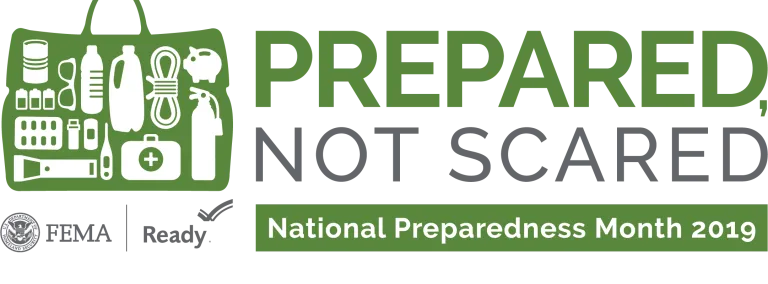'Prepared, not scared'
Helping families and communities prepare for a variety of disasters and emergencies during National Preparedness Month
“Training for something that I don’t want to happen—that’s how I spend the majority of my time,” said Paul “Woody” Hover, Emergency Rescue Team (ERT) lead at Sanford Underground Research Facility (Sanford Lab). His team is in the midst of planning a multi-organizational emergency drill that involves local emergency facilities, law enforcement and months of preparation. While the drill seems like a lot of effort, Hover said that on a smaller scale all households should be doing the same thing.
“Safety is pretty simple: have a plan and practice it—but how many people actually do that? When the smoke alarm is going off at two in the morning, that's not the time to figure it out,” Hover said.
National Preparedness Month (NPM) is recognized each September to help families and communities prepare for a variety of disasters and emergencies. The 2019 theme is "Prepared, Not Scared.”
“You need to get that critical thought process going,” said Hover. “Once you have a plan, if something really bad happens, you’ll realize you already know what to do.”
According to the National Safety Council, every home should have an emergency supply kit located in an accessible storage area. It's best to store the items in plastic containers that are easy to grab and carry. Kits should be checked every six months, and expired items should be replaced to keep the kit up to date.
Emergency kits are meant to help you survive not only during an emergency, but also during the aftermath. When a tornado hit Marion, Illinois, 50 percent of the tornado-related injuries occurred during rescue attempts, cleanup efforts and other post-tornado activities, said the Centers for Disease Control and Prevention.
Home emergency supply kits should include:
- One gallon of water per person per day for at least three days
- Enough nonperishable food for at least three days and a can opener; keep protein-packed foods you can cook without electricity, such as tuna, peanut butter and granola bars, and don't forget about food for your pets
- Hand-crank or battery-powered radio with extra batteries to stay up to date on the latest weather alerts
- Flashlight with extra batteries
- First aid kit with gauze, tape, bandages, antibiotic ointment, aspirin, a blanket, nonlatex gloves, scissors, hydrocortisone, thermometer, tweezers and instant cold compress
- Tool kit with basic tools, in case you need to shut off utilities
- Hand sanitizer and garbage bags for sanitation
- Plastic sheeting and duct tape in case of broken windows or a leaky roof
- Whistle to signal for help so rescuers can locate you
The Environmental, Safety and Health, and Quality Assurance Department at Sanford Underground Research Facility promotes health and safety in the workplace, as well as healthy living and wellness for all employees. If you have questions about health and wellness, please contact our occupational health nurse, Laura Baatz, who is onsite daily at lbaatz@sanfordlab.org.
